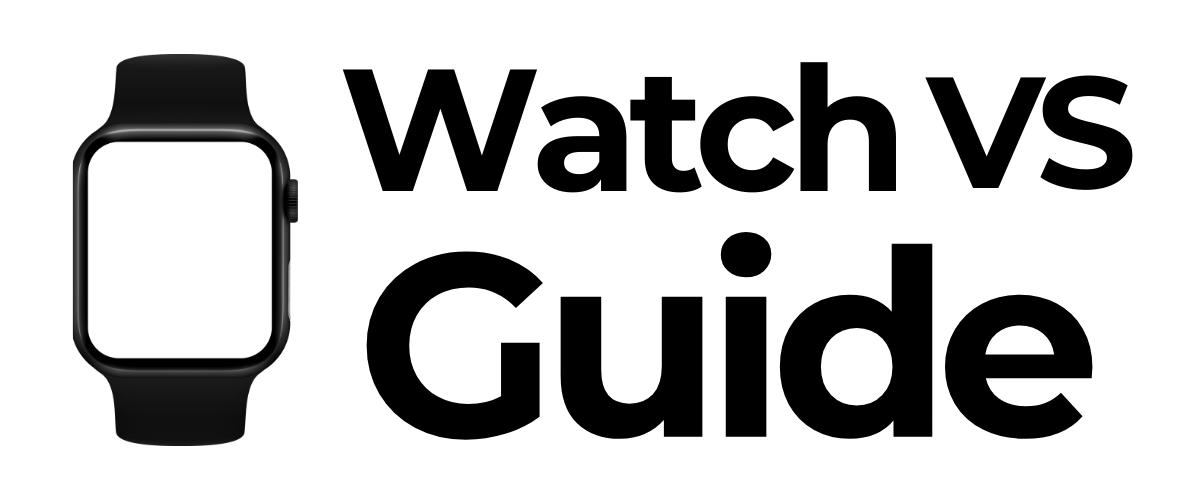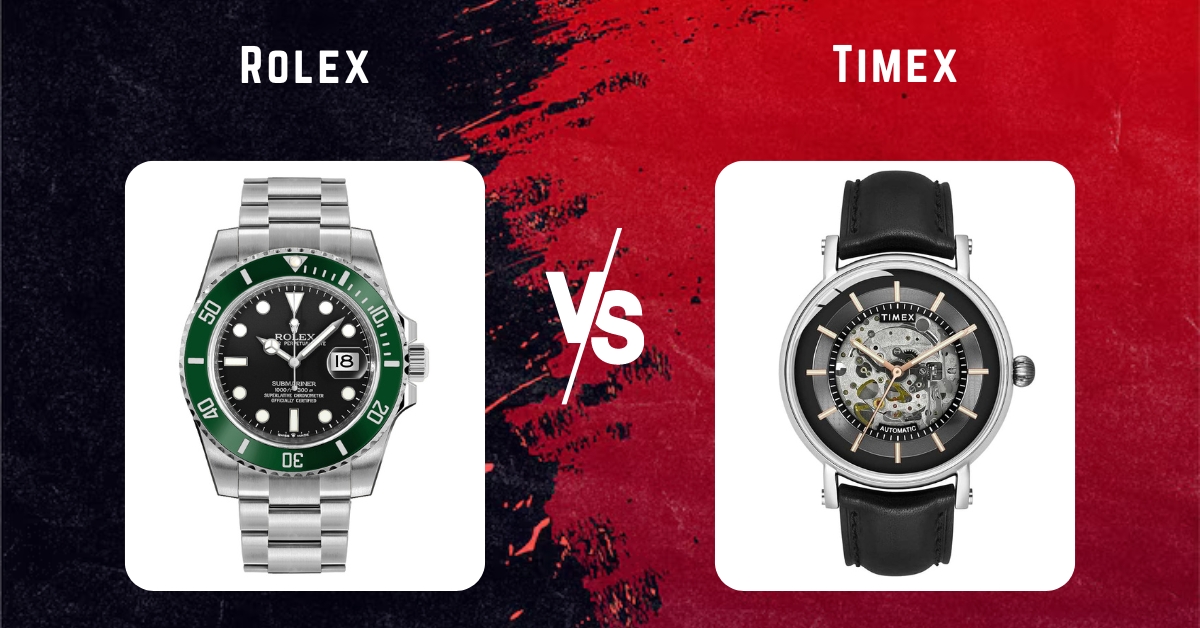On the wristwatch battlefield, two titans stand out: Rolex, the symbol of luxury and prestige, and Timex, the champion of affordability and durability. While both tell time, their approaches couldn’t be more different. This comprehensive guide dives deep into the Rolex vs. Timex debate, exploring their histories, functionalities, styles, and value propositions.
A Legacy of Luxury: The Rolex Story
Founded in 1905 by Hans Wilsdorf and Alfred Davis, Rolex has become synonymous with high-end watches. Their dedication to precision engineering, innovative materials, and timeless design has earned them a reputation as the ultimate status symbol. Here’s a breakdown of what makes Rolex tick:
Movements: Rolex utilizes self-winding mechanical movements, renowned for their craftsmanship and accuracy. These intricate mechanisms are certified chronometers, meaning they meet stringent Swiss standards for timekeeping.
Materials: Rolex watches are crafted from premium materials like 904L stainless steel, known for its superior corrosion resistance. Additionally, they offer 18k gold and platinum options for an opulent touch.
Investment Potential: Rolex models, particularly certain sports watches like the Daytona and Submariner, hold their value incredibly well. They can even be appreciated over time, making them a coveted collector’s item.
Pros:
- Unmatched craftsmanship and quality
- Superior materials and build
- Status symbol and prestige
- Potential investment value
Cons:
- Extremely high price point
- Regular maintenance required
- More susceptible to theft due to high-value
The Everyman’s Companion: The Timex Legacy
Founded in 1854 as the Waterbury Clock Company, Timex has carved a niche for itself in the affordable watch market. Their focus on functionality, reliability, and affordability has made them a household name. Let’s explore what Timex brings to the table:
Movements: Timex primarily utilizes quartz movements, known for their accuracy and low maintenance. These battery-powered movements are highly reliable and require minimal upkeep.
Materials: Timex watches utilize a variety of materials, including stainless steel, brass, and resin. These choices keep costs down while ensuring durability for everyday wear.
Accessibility: Timex offers a wide range of styles and features at accessible price points. This makes them a perfect choice for first-time watch buyers or those seeking a practical timepiece.
Pros:
- Affordable price range
- Wide variety of styles and features
- Reliable and low-maintenance quartz movements
- Durable construction for everyday wear
Cons:
- Less prestigious brand image compared to Rolex
- Movements generally not as intricate as high-end mechanical movements
- Lower resale value
Rolex vs. Timex: A Comparison Table
| Feature | Rolex | Timex |
|---|---|---|
| Movement | Self-winding mechanical (automatic) | Quartz |
| Accuracy | Highly accurate, may require periodic adjustments | Very high long-term accuracy due to quartz technology |
| Materials | Premium materials like 904L stainless steel, 18k gold, platinum | Stainless steel, brass, resin |
| Durability | Superior construction, built to withstand extreme conditions | Durable for everyday wear |
| Price Range | $7,000 – $100,000+ | $50 – $200+ |
| Investment Potential | High for certain models | Low |
| Prestige Factor | High | Low |
| Style | Classic and iconic designs | Wide variety of styles from classic to trendy |
| Functionality | Often features like chronographs, GMT complications, diving bezels | Features like indiglo night-lights, day-date displays, alarms, fitness trackers |
| Maintenance | Requires regular servicing by a qualified professional | Low maintenance, primarily battery replacements |
Functionality: Beyond Telling Time
While both Rolex and Timex excel at keeping time, they offer additional functionalities:
Rolex: Many Rolex models boast features like chronographs (stopwatches), GMT complications (displays a second-time zone), and diving bezels (rotational bezels for tracking elapsed dive time). These cater to the specific needs of athletes, travelers, and divers.
Timex: Timex offers a diverse range of functionalities. Their watches might include features like indiglo nightlights, day-date displays, alarms, and even fitness trackers. These cater to everyday needs like visibility in low light, keeping track of dates, setting alarms, and monitoring fitness goals.
Ultimately, the choice of function depends on your individual needs and lifestyle.
Style Statements: From Classic to Bold
Both Rolex and Timex cater to a wide range of styles, allowing you to express your personality. Here’s a glimpse:
Rolex: Rolex offers iconic styles like the Submariner (diver watch), the Daytona (chronograph), and the Datejust (dress watch). These timeless designs have transcended generations and are instantly recognizable.
Timex: Timex provides a vast selection, from classic field watches and dress watches to trendy digital watches and sports watches. Their diverse styles cater to various tastes and budgets.
Consider your personal style and the occasion when choosing your watch.
The Value Proposition: Finding the Right Fit
The most significant difference between Rolex and Timex lies in their
The most significant difference between Rolex and Timex lies in their value proposition. Here’s a breakdown to help you decide:
For the Status Seeker: If prestige and exclusivity are paramount, Rolex reigns supreme. Owning a Rolex signifies success and discerning taste.
For the Watch Enthusiast: For those who appreciate intricate mechanics and the art of watchmaking, a Rolex offers a gateway into a world of horological excellence.
For the Practical Buyer: If affordability and functionality are your priorities, Timex shines. Their watches offer reliable timekeeping, diverse features, and durability at a fraction of the cost of a Rolex.
Here are 5 questions to ask yourself when choosing:
- Budget: How much are you comfortable spending on a watch?
- Lifestyle: Do you need a watch for everyday wear, specific activities, or special occasions?
- Aesthetics: What style suits your personality? Classic, modern, sporty, or something else?
- Functionality: Do you need additional features like chronographs, alarms, or fitness trackers?
- Investment Potential: Are you looking for a watch that might appreciate in value over time?
By answering these questions, you can determine whether a Rolex or a Timex aligns better with your needs and preferences.
Beyond the Brands: Exploring Alternatives
The watch world extends beyond Rolex and Timex. Here are some alternatives to consider:
Swiss Luxury Brands: Omega, Breitling, and TAG Heuer offer luxury watches with exceptional craftsmanship and innovative features at a price point often below Rolex.
Japanese Watchmakers: Seiko and Citizen are renowned for their reliable automatic and quartz movements, offering excellent value for money.
Microbrand Watches: Smaller, independent watchmakers are creating exciting, unique designs at competitive prices. These can be a great option for those seeking a distinctive timepiece.
Researching these alternatives can open doors to a wider range of options that suit your taste and budget.
The Final Verdict: Rolex vs. Timex – There’s No One-Size-Fits-All
Ultimately, the choice between Rolex and Timex comes down to your individual priorities. Here’s a quick recap:
- Choose Rolex if: You prioritize prestige, intricate mechanics, and potential investment value.
- Choose Timex if: You value affordability, low maintenance, a wide range of styles, and reliable functionality.
Remember, the best watch is the one that complements your lifestyle and makes you feel confident.
Bonus Tip: Consider pre-owned or vintage watches. Reputable dealers offer a vast selection of Rolex and Timex watches at lower price points, allowing you to access luxury or vintage styles without breaking the bank.
Whether you choose a Rolex or a Timex, a well-crafted watch can be a cherished companion for years to come.
A Deeper Dive: Exploring Specific Models
While the Rolex vs. Timex debate focuses on brand identity, let’s delve into some popular models from each brand:
Rolex:
Submariner: The quintessential dive watch, renowned for its water resistance, durability, and iconic design. (Price Range: $8,000 – $12,000+)
Datejust: A timeless dress watch known for its elegance and functionality with a date window. (Price Range: $8,500 – $15,000+)
Daytona: A legendary chronograph favored by racing enthusiasts and watch collectors for its stopwatch function and distinctive look. (Price Range: $30,000 – $100,000+)
Timex:
Weekender Chronograph: A stylish and affordable chronograph with a classic design, perfect for everyday wear. (Price Range: $75 – $125)
Expedition Camper: A rugged and water-resistant watch ideal for outdoor activities, featuring indiglo night light and a durable construction. (Price Range: $50 – $75)
Metropolitan: A sleek and sophisticated dress watch with a date window, offering a touch of elegance at a budget-friendly price. (Price Range: $80 – $150)
This is just a small selection, and both Rolex and Timex offer a vast array of models catering to different preferences and budgets.
Investing in Time: Caring for Your Watch
Regardless of brand, proper care extends the life of your watch. Here are some general tips:
Avoid extreme temperatures: Don’t expose your watch to extreme heat or cold, as it can damage the movement and seals.
Keep it clean: Regularly wipe down your watch with a soft, damp cloth to remove sweat, dirt, and dust.
Avoid harsh chemicals: Keep your watch away from cleaning products, perfumes, and other harsh chemicals that can damage the materials.
Service your watch: Regularly have your watch serviced by a qualified professional, especially for mechanical watches like Rolex.
Following these tips ensures your timepiece continues to tick for years to come.
Beyond Timekeeping: The Cultural Impact of Watches
Watches transcend their utilitarian purpose. They hold cultural significance, symbolizing success, heritage, and personal style.
Rolex: Rolex watches have become status symbols, often associated with luxury lifestyles and high achievers. Their iconic designs are featured in movies, music videos, and pop culture, further solidifying their cultural impact.
Timex: Timex watches represent affordability and practicality. They’ve been featured in countless advertisements and worn by everyday people, making them a familiar sight around the globe.
Watches tell more than just time; they tell a story about the wearer and their values.
Conclusion: Choosing the Watch that Speaks to You
Rolex and Timex offer vastly different experiences. Rolex is the epitome of luxury and prestige, while Timex focuses on affordability and practicality. Ultimately, the “better” watch is the one that aligns with your needs, budget, and personality.
So, whether you crave a timepiece steeped in history and craftsmanship or a reliable companion for your everyday adventures, there’s a perfect watch waiting for you.
FAQs
Is a Rolex more accurate than a Timex?
Both Rolex (with its mechanical movements) and Timex (with its quartz movements) can be highly accurate timekeepers. However, quartz movements generally boast slightly better long-term accuracy due to their reliance on a battery and crystal oscillator.
Is a Rolex a good investment?
Certain Rolex models, particularly sports watches like the Daytona and Submariner, have historically held their value well and even appreciated over time. This can make them a good investment for collectors. However, not all Rolex models appreciate, and the market can fluctuate.
Which is more durable, a Rolex or a Timex?
Both Rolex and Timex watches are known for their durability. However, Rolex, with its premium materials and superior construction, is generally considered more durable in the long run. They are built to withstand extreme conditions.
Are there any alternatives to Rolex and Timex?
Absolutely! The watch world offers a vast selection beyond these two brands. Here are some options: * Swiss Luxury: Omega, Breitling, TAG Heuer (Similar prestige to Rolex) * Japanese: Seiko, Citizen (Excellent value for reliable automatic and quartz movements) * Microbrands: Independent watchmakers offering unique designs at competitive prices
Should I buy a pre-owned or vintage watch?
Pre-owned and vintage watches can be a great option, especially for Rolex. Reputable dealers offer a selection of used watches at lower price points. This allows you to access luxury or vintage styles without breaking the bank. Just ensure you buy from a reputable source.

